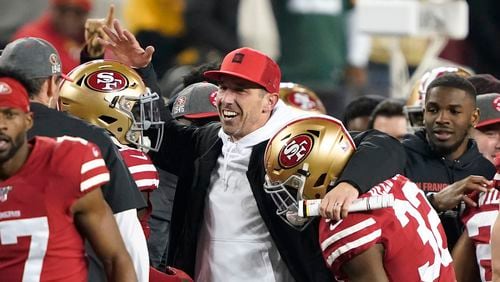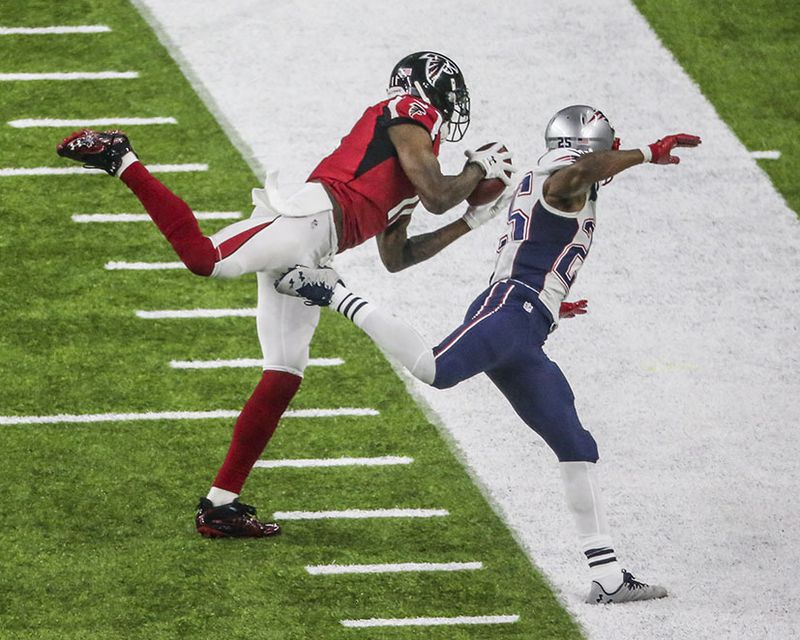Here’s how many times Kyle Shanahan’s San Francisco 49ers have passed in two playoff games — 27. They also suffered three sacks, so if you care to count this as 30 pass plays, be my guest.
Here’s how many times Shanahan’s 49ers have run the ball in two playoff games — 89. And here’s where we pause to underscore the obvious: The coach who DID NOT RUN THE BALL in the third/fourth quarters of Super Bowl 51 is taking his team to Super Bowl 54 by ...
Running the ball.
We stipulate Kyle Shanahan didn’t just become an advocate of the ground game. Since he became an NFL offensive coordinator — he did stints with Houston, Washington, Cleveland and most spectacularly with your Atlanta Falcons — he has always sought a run/pass balance. Some consider the run as nothing more than a palate-cleanser between pretty pass plays. Shanahan has never been among them.
His 2016 Falcons, still his magnum opus, ranked third among NFL teams in yards passing, fifth in yards rushing. They were 12th in the league in rushing attempts; they were 26th — hard to believe, given that Matt Ryan threw for a career-best 4,944 yards and was MVP — in passes.
The reason those Falcons were among the 10 greatest offenses ever wasn’t just that they gained a lot of yards and averaged 33.8 points. They also struck a blend not often seen in these chuck-it-every-down days — though these playoffs, with Shanahan’s 49ers and the brute force of Tennessee’s Derrick Henry, have seemed a throwback to the early ’70s. Indeed, Terry Bradshaw, who completed eight passes in Pittsburgh’s AFC championship victory and nine in the subsequent Super Bowl in January 1975, greeted Shanahan after Sunday’s demolition of Green Bay by saying, “You reminded me of my coach, Chuck Noll.”
The 49ers' Jimmy Garappolo tried eight passes against the Packers, tying for the second-fewest in a playoff game. He threw two in the second half, none in the third quarter. Garappolo didn't pass on consecutive downs. The 49ers did, however, run the ball 11 times in succession. Tevin Coleman, of whom you've heard, injured his shoulder in the second quarter. Raheem Mostert, of whom almost nobody had heard, carried 29 times for 220 yards and four touchdowns.
As Bill Barnwell of ESPN has written: “Being a running back under Shanahan is a license to print money.” Steve Slaton had his only 1,000-yard season under Shanahan; Alfred Morris had two of his three; Devonta Freeman had both of his. Sure enough, the latter would seize that moment to become, albeit briefly, the NFL’s highest-paid back. In the Falcons’ crash from leading New England by 25 points to back-to-back losing seasons, Freeman’s contract stands as the original sin.
About Mostert: He’s 27, on his seventh different organization after going undrafted out of Purdue. Before this season, he’d rushed for a total of 297 yards, 293 of those under Shanahan in San Fran. This season he rushed for 772. (Coleman had 544.) On Sunday, Mostert had the second-biggest yield — trailing only Eric Dickerson’s 248 yards in January 1986 — in postseason annals.
For as much as we ooh and ah over the forward pass, it’s not always a barometer of excellence. The top four teams in passing yards this season were the Buccaneers, Cowboys, Falcons and Rams. None made the playoffs. The top four in rushing were the Ravens, 49ers, Titans and Seahawks. All made the playoffs, and the postseason record of the four is 5-3. In this era of chuck-and-duck, are we seeing the beginnings of a correction? Don’t know. Too soon. Anyway, back to Shanahan.
On the morning of MLK Day 2020, I flipped through the stat book of a game staged in NRG Stadium on Feb. 5, 2017. A forgotten number from that unforgettable night: The Falcons had only 46 plays, less than half the Patriots’ 93. Of the Falcons’ 18 rushes, four came after they built their 28-3 lead. (A fifth — a 1-yard loss by Coleman, who’d caught the touchdown pass to make it 28-3 — was erased by the first of Jake Matthews’ holding penalties.) Only once over that span did the Falcons run on consecutive downs, that when Coleman gained 8 and then 1 to set up the play that changed everything. Not incidentally, Coleman hurts his ankle on the second run.
Third-and-1 at the Falcons’ 36, 8:31 remaining, the Patriots still 16 points in arrears: Shanahan calls a pass; Freeman whiffs on the blitzing Dont’a Hightower; a blindsided Ryan fumbles; Pats recover and take five plays to halve their deficit. Run the ball there and the worst that happens is a punt, which wouldn’t be a bad thing.
Now it’s 28-20 and the Falcons, who’d been running free and easy only 10 minutes ago, are sweating. Starting at their 10, Shanahan dials up a nice one — Ryan finding Freeman for 39 yards on a wheel route. The game is almost won. On first-and-10, Freeman gains 2 to the Pats’ 49. On second-and-8, Ryan looses maybe his greatest throw and Julio Jones makes maybe his greatest catch, a leaping toe-dragging astonishment that gives the Falcons a first down at the 27. At this moment, the game should have been decided.
Credit: John Spink
Credit: John Spink
Freeman for minus-1 on first down. Not a great play, but no matter. Run it twice more and let Matt Bryant make it 31-20. Alas, the Falcons wouldn’t run the ball again. Ryan is sacked on second down when Trey Flowers flings the limping Alex Mack backward. The 40-yard field-goal try becomes a 52-yarder. On third-and-23, Ryan throws short for Mohamed Sanu, trying to recoup some of those yards. Matthews is again flagged. It’s third-and-33. Ryan misses on a throw to Taylor Gabriel. The clinching field goal is never attempted. The Falcons punt.
That was Shanahan’s final game as Falcons OC. He left to coach the 49ers and was asked at his introductory press conference, “Why didn’t you run the ball?” He has said he thinks of the Super Bowl every day, and how could he not? His play-calling had been the chief reason — even above Ryan, who hasn’t been quite as good since — the Falcons were positioned to hoist the Lombardi Trophy, whereupon his play-calling threw it away. Now he’s back in the Super Bowl with a team of his own, and his team is special in large part because he’s an ace at calling running plays.
Shanahan had top-five rushing teams in Washington and here, and he has one again. “If they can’t stop it,” he told Bradshaw, “you keep doing it.” So why, with a Super Bowl to be won, didn’t this mastermind — I’m not using the term archly; I think Shanahan is a tremendous coach — run it twice more?
Short answer: I don’t know. I’m pretty sure he’ll never know. But I’m darn sure, if he’s up 25 on Kansas City two weeks hence, he won’t say, “Time to air it out.”








